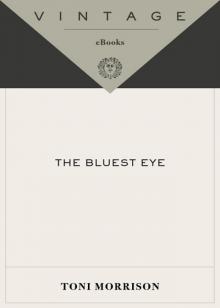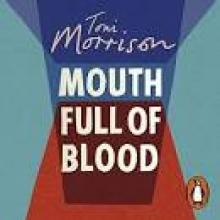- Home
- Toni Morrison
Love Page 2
Love Read online
Page 2
He was wiping salt dust from his hands when the two people under his care arrived at the same time, one hollering, “Hoo! Am I glad you did this! Thought I’d break my neck.” The other saying, “What you mean, Gran? I had your arm all the way from the bus.”
“Course you did, baby.” Vida Gibbons smiled, hoping to derail any criticism her husband might be gathering against her grandson.
At dinner, the scalloped potatoes having warmed his mood, Sandler picked up the gossip he’d begun while the three of them were setting the table.
“What did you say she wanted?” Vida asked, frowning. The ham slices had toughened with reheating.
“Looking for those Cosey women, I reckon. That was the address she had. The old address, I mean. When wasn’t nobody out here but them.”
“That was written on her paper?” She poured a little raisin sauce over her meat.
“I didn’t look at it, woman. I just saw her check it. Little scrap of something looked like it came from a newspaper.”
“You were concentrating on her legs, I guess. Lot of information there.”
Romen covered his mouth and closed his eyes.
“Vida, don’t belittle me in front of the boy.”
“Well, the first thing you told me was about her skirt. I’m just following your list of priorities.”
“I said it was short, that’s all.”
“How short?” Vida winked at Romen.
“They wear them up to here, Gran.” Romen’s hand disappeared under the table.
“Up to where?” Vida leaned sideways.
“Will you two quit? I’m trying to tell you something.”
“You think she’s a niece, maybe?” asked Vida.
“Could be. Didn’t look like one, though. Except for size, looked more like Christine’s people.” Sandler motioned for the jar of jalapeños.
“Christine don’t have any people left.”
“Maybe she had a daughter you don’t know about.” Romen just wanted to be in the conversation, but as usual, they looked at him as if his fly was open.
“Watch your mouth,” said his grandfather.
“I’m just talking, Gramp. How would I know?”
“You wouldn’t, so don’t butt in.”
“Stch.”
“You sucking your teeth at me?”
“Sandler, lighten up. Can’t you leave him alone for a minute?” Vida asked.
Sandler opened his mouth to defend his position, but decided to bite the tip off the pepper instead.
“Anyway, the less I hear about those Cosey girls, the better I like it,” said Vida.
“Girls?” Romen made a face.
“Well, that’s how I think of them. Hincty, snotty girls with as much cause to look down on people as a pot looks down on a skillet.”
“They’re cool with me,” said Romen. “The skinny one, anyway.”
Vida glared at him. “Don’t you believe it. She pays you; that’s all you need from either one.”
Romen swallowed. Now she was on his back. “Why you all make me work there if they that bad?”
“Make you?” Sandler scratched a thumb.
“Well, you know, send me over there.”
“Drown this boy, Vida. He don’t know a favor from a fart.”
“We sent you because you need some kind of job, Romen. You’ve been here four months and it’s time you took on some of the weight.”
Romen tried to get the conversation back to his employers’ weaknesses and away from his own. “Miss Christine always gives me something good to eat.”
“I don’t want you eating off her stove.”
“Vida.”
“I don’t.”
“That’s just rumor.”
“A rumor with mighty big feet. And I don’t trust that other one either. I know what she’s capable of.”
“Vida.”
“You forgot?” Vida’s eyebrows lifted in surprise.
“Nobody knows for sure.”
“Knows what?” asked Romen.
“Some old mess,” said his grandfather.
Vida stood and moved to the refrigerator. “Somebody killed him as sure as I’m sitting here. Wasn’t a thing wrong with that man.” Dessert was canned pineapple in sherbet glasses. Vida set one at each place. Sandler, unimpressed, leaned back. Vida caught his look but decided to let it lie. She worked; he was on a security guard’s hilarious pension. And although he kept the house just fine, she was expected to come home and cook a perfect meal every day.
“What man?” Romen asked.
“Bill Cosey,” replied Sandler. “Used to own a hotel and a lot of other property, including the ground under this house.”
Vida shook her head. “I saw him the day he died. Hale at breakfast; dead at lunch.”
“He had a lot to answer for, Vida.”
“Somebody answered for him: ‘No lunch.’ ”
“You forgive that old reprobate anything.”
“He paid us good money, Sandler, and taught us, too. Things I never would have known about if I’d kept on living over a swamp in a stilt house. You know what my mother’s hands looked like. Because of Bill Cosey, none of us had to keep doing that kind of work.”
“It wasn’t that bad. I miss it sometimes.”
“Miss what? Slop jars? Snakes?”
“The trees.”
“Oh, shoot.” Vida tossed her spoon into the sherbet glass hard enough to get the clink she wanted.
“Remember the summer storms?” Sandler ignored her. “The air just before—”
“Get up, Romen.” Vida tapped the boy’s shoulder. “Help me with the dishes.”
“I ain’t finished, Gran.”
“Yes you are. Up.”
Romen, forcing air through his lips, pushed back his chair and unfolded himself. He tried to exchange looks with his grandfather, but the old man’s eyes were inward.
“Never seen moonlight like that anywhere else.” Sandler’s voice was low. “Make you want to—” He collected himself. “I’m not saying I would move back.”
“I sure hope not.” Vida scraped the plates loudly. “You’d need gills.”
“Mrs. Cosey said it was a paradise.” Romen reached for a cube of pineapple with his fingers.
Vida slapped his hand. “It was a plantation. And Bill Cosey took us off of it.”
“The ones he wanted.” Sandler spoke to his shoulder.
“I heard that. What’s that supposed to mean?”
“Nothing, Vida. Like you said, the man was a saint.”
“There’s no arguing with you.”
Romen dribbled liquid soap into hot water. His hands felt good sloshing in it, though it stung the bruises on his knuckles. His side hurt more while he stood at the sink, but he felt better listening to his grandparents fussing about the olden days. Less afraid.
The girl did not miss the house, and the man with the Ice-Off was not wrong: the house was graceful, imposing, and its peaked third-story roof did suggest a church. The steps to the porch, slanted and shiny with ice, encouraged caution, for there was no railing. But the girl clicked along the walk and up the steps without hesitation. Seeing no bell, she started to knock, hesitating when she noticed a shaft of light below, to the right of the porch. She went back down the sloping steps, followed the curve marked by half-buried slate, and descended a flight of iron stairs lit by a window. Beyond the window, a door. No wind buffeted her there. The area had the look of what was called a garden apartment by some—by others, a basement one. Pausing at the pane, she saw a seated woman. On the table before her were a colander, newspapers, and a mixing bowl. The girl tapped on the window and smiled when the woman looked up. She rose slowly but once on her feet moved rapidly to the door.
“What is it?” The door opened just wide enough to expose one gray eye.
“I came about the job,” said the girl. A marine odor hovered in the crack.
“Then you’re lost,” said the woman and slammed the door.
&n
bsp; The girl banged on it, shouting, “It says One Monarch Street! This is number one!”
There was no answer, so she went back to the window and pecked the glass with the nails of her left hand while her right pressed the newsprint toward the light.
The woman came back to the window, her eyes flat with annoyance as they stared at the girl, then moved from the young face and its pleading smile to the piece of paper. She squinted at it, looked again at the face, then back at the piece of paper. She motioned toward the door and disappeared from the window, but not before a shard of panic glinted in her eyes, then died.
When the girl was inside, the woman offered neither seat nor greeting. She took the advertisement and read. A penciled circle separated the few lines of one help-wanted notice from others above and below.
COMPANION, SECRETARY SOUGHT BY MATURE, PROFESSIONAL LADY. LIGHT BUT HIGHLY CONFIDENTIAL WORK. APPLY TO MRS. H. COSEY. ONE MONARCH STREET, SILK.
“Where did you get this?” The woman’s tone was accusatory.
“From the newspaper.”
“I can see that. Which? The Harbor Journal?”
“Yes, ma’am.”
“When?”
“Today.”
She handed back the advertisement. “Well. I guess you better sit down.” The snap in her voice loosened.
“Are you Mrs. H. Cosey?”
She gave the girl a look. “If I was, I’d know about that little scrap of paper, wouldn’t I?”
The girl’s laughter was like the abrupt agitation of bells. “Oh, right. Sorry.”
They both sat then and the woman returned to the work of deveining shrimp. Twelve rings, two on three fingers of each hand, snatched light from the ceiling fixture and seemed to elevate her task from drudgery to sorcery.
“You have a name?”
“Yes, ma’am. Junior.”
The woman looked up. “Your daddy’s idea?”
“Yes, ma’am.”
“Have mercy.”
“You can call me June, if you want.”
“I don’t want. Your daddy give you a last name? Prom, maybe? Or Choir?”
“Viviane,” said Junior. “With an e.”
“An e? You from around here?”
“Used to be. I’ve been away.”
“I never heard tell of any family around here named Viviane with an e or without one.”
“Oh, they’re not from here. Originally.”
“Where then?”
Jacket leather purred as Junior Viviane shrugged her shoulders and reached across the table to the colander. “Up north. Can I help you with that, ma’am?” she asked. “I’m a pretty fair cook.”
“Don’t.” The woman held up a staying hand. “Needs a certain rhythm.”
A bouquet of steam wandered away from water lifting to a boil on the stove. Behind the table was a wall of cupboards, their surfaces as pale and handled as yeast dough. The silence stretching between the two women tightened. Junior Viviane fidgeted, her jacket creaking over the tick of shrimp shells.
“Is Mrs. H. Cosey here, ma’am?”
“She is.”
“May I speak to her, please?”
“Let me see that thing again.” The woman wiped her hands on a dish towel before touching the ad. “ ‘Highly confidential,’ huh?” She pursed her lips. “I believe that. I sure do,” she said, and dropped the paper with thumb and forefinger, as though depositing a diaper into a soak pail. She wiped her hands again and selected a shrimp. There, just there, beneath the flesh she held in her fingers, crept a dark and tender line. Deft as a jeweler, she removed it.
“Can I see Mrs. Cosey now, please?” Junior sank her chin into her palm, underscoring her question with a smile.
“I guess. Sure. Up those stairs, then some more stairs. All the way to the top.” She motioned toward a flight of stairs leading from an alcove near the stove. Junior stood.
“I don’t suppose you interested in my name?”
Junior turned back, her grin a study in embarrassment and muddle. “Oh, yes, ma’am. I’m sorry. I am. I’m just so nervous.”
“It’s Christine. If you get the ‘highly confidential’ job you’ll need to know it.”
“I hope so. Nice meeting you, Christine. Really. Second floor, you said?”
Her boots were muffled on the stairs.
Christine turned away. She should have said, “No. Third,” but she didn’t. Instead she glanced at the warming light on the rice cooker. Gathering the shrimp shells, she plopped them into the boiling water and adjusted the flame. Returning to the table, she picked up a garlic paw and, enjoying her bedizened hands as usual, peeled two of the cloves. These she diced and left on the cutting board. The old Philco refrigerator murmured and trembled. Christine gave it a reassuring pat before bending to a low cabinet, thinking, What’s she up to now? Must be scared or fixing to make a move. What, though? And how did she manage to get a notice in the paper without my knowing? She selected a silver tureen with a fitted glass bowl, sighing at the stubborn tarnish in the crevices of the C’s on its cover. Like all the carved letters in the house, the double C’s went beyond ornate to illegible. Even on the handle of the spoon in her apron pocket, the initials, once hooked together for life, were hardly a trace. It was tiny, a coffee spoon, but Christine ate every meal she could with it just to hold close the child it was given to, and hold also the pictures it summoned. Scooping peach slices with it from homemade ice cream, helpless in the thrill, never minding the grains of sand blowing over the dessert—the whole picnic lunch for that matter.
Christine soaped and rinsed the glass bowl as her thoughts skittered from beach picnics to Silver Dip, salt-spiced air to Q-tips, and on to the interview being held at that moment in the bedroom of the meanest woman on the coast. While sitting across from the lying Miss Junior-but-you-can-call-me-June, Christine had put her own body of forty—even thirty—years ago next to the girl’s and won. The girl had good legs (well, knees and thighs were all she could see in those tall boots) and the narrow, poked-out behind that was all the rage these days. But she had nothing to rival the Christine of 1947, when the beach was the color of cream but glittery and the sucking waves reached out from water so blue you had to turn away lest it hurt your eyes. It was the girl’s face that struck gongs of envy. That and her Amazon hair. At first Christine had stared at her, then, wary, concentrated on the newspaper clipping. Except for that, she would never have let into the house a strange girl with no purse. The shrimp work gave her ample time to get a bounce from her, some sense of what (never mind who) she was. It also gave her reason to sustain a lowered gaze, because she did not like the heart jump that came when she looked in the girl’s eyes. She had the unnerving look of an underfed child. One you wanted to cuddle or slap for being needy.
Christine stirred the garlic into butter softening in a skillet, then set about making the roux. After a moment she sprinkled in flour and watched it bronze before loosening the paste with stock and whisking it smooth.
“I’m a pretty fair cook” is what the girl had said, all the while reaching with dirty hands for the bowl of cleaned shrimp. And “Used to be” from around here, she’d said, while sitting in front of the best-known woman in the county, a woman who knew every black person ever born from Niggerhead Rock to Sooker Bay, from Up Beach to Silk, and half the ones in Harbor as well, since that was where she had spent (or wasted) a whole chunk of her life. Junior Viviane. With an e. Sounded like a name from a baseball card. So what was the heart skip for? Was she afraid she would blush in recognition at any moment, sharpening her voice to a razor to cut off the possibility? The telltale signs of a runaway’s street life were too familiar: bus station soap, other people’s sandwiches, unwashed hair, slept-in clothes, no purse, mouth cleaned with chewing gum instead of toothpaste. So what did Heed want her for? How had an ad been placed in the newspaper without a working telephone? The Gibbons boy must have helped her—adding that errand to others after working in the yard. Whatever was going on was
a trap laid by a high-heeled snake. Some new way to rob her future just as she had ripped off her past.
“I’ll be damned,” she whispered.
Christine spread her fingers for the familiar jolt the diamonds gave her. Then she assembled the rice, the shrimp, the sauce, layering each meticulously, artfully, in the casserole. It would remain warm while she tossed a light salad. Then she would arrange it all on a silver tray, take it up three flights of stairs, where she hoped it would choke the meanest thing on the coast.
“My Lord. Snow.” She spoke without turning her head, simply parting the draperies further. “Come over here and look. Here of all places.”
Junior moved near the tiny woman at the window and peered through the glass, trying but unable to see snowflakes. The woman looked to be in her sixties at least—hair made megablack by a thick border of silver at the scalp—but she had something of a little-girl scent: butter-rum candy, grass juice, and fur.
“Strange, don’t you think? We never get snow. Never.”
“I saw a man sprinkling ice salt,” said Junior. “Since he already had it, he must have expected to use it.”
Startled, the woman turned. The girl had called her a liar before saying hello.
“You’re here for the job?” Her eyes swept Junior’s face, then examined her clothes. She knew the applicant was in the house long before she heard footsteps that were neither Christine’s nor Romen’s. Then she had quickly positioned herself at the window to strike the right pose, give a certain impression. But she needn’t have bothered. The girl was not at all what she had expected. Not just the messy hair and tacky clothes; there was some bold laziness in her manner, the way she talked. Like the “Yeah” she gave to Heed’s question.

 Paradise
Paradise Beloved
Beloved Home
Home Tar Baby
Tar Baby The Bluest Eye
The Bluest Eye Jazz
Jazz Love
Love Sula
Sula Mouth Full of Blood
Mouth Full of Blood Song of Solomon
Song of Solomon The Source of Self-Regard
The Source of Self-Regard A Mercy
A Mercy Beloved_a novel
Beloved_a novel